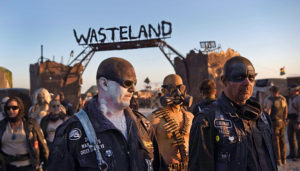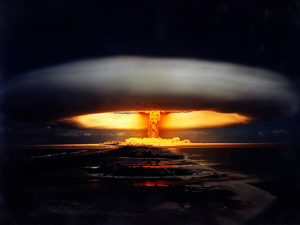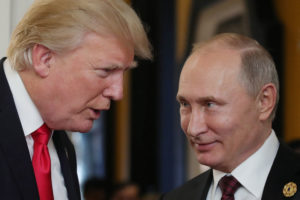The neoliberal order that triumphed on a global scale in the Nineties and 2000s aspired to the free movement of goods, capital, people, and information throughout the world. Unfettered capitalism would release the global economy from arbitrary constraints, and if economic inequality resulted, this was regarded as tolerable as long as most boats were going to rise, and as long as efficiencies in production were going to reduce the cost of consumer goods until they could be put within reach of hundreds of millions of the world’s poor.
This order was in retreat even before the pandemic and the Russian invasion of Ukraine. Total international merchandise trade peaked in 2008, when it accounted for 51% of the world’s output. It plummeted during the Great Recession of 2008-2009 and has never durably recovered. The Great Recession, and the widening disparity between rich and poor that followed, shattered the belief that a global world of free trade was bringing prosperity to all.
Prior to the crash, “protectionism” had been a dirty word for 30 years. In the 2010s, however, Donald Trump and likeminded politicians elsewhere bid for power by calling on their countrymen to embrace a protectionist future. In America, Trump wanted to reinvigorate the country’s manufacturing base and multiply the number of good jobs. He also wanted to reserve such jobs for American citizens rather than offer them to foreigners, often non-whites who came, Trump alleged, from “shithole countries”.
Suspicion of foreigners facilitated Trump’s victory in 2016, as it did Brexit’s triumph. By the late 2010s, hostility to non-European peoples was on the rise even in the cosmopolitan EU, prompting Germany to pay Turkey and Greece billions to park tens of thousands of Middle Eastern and North African refugees in camps far from the European heartland.
All these forces were in motion before the twin crises of the pandemic and Ukraine struck. The pandemic froze populations in place, stalling migration as severely as world wars had once done. Meanwhile, the vast disruption of the most mundane processes of manufacturing, commerce, and transportation undermined the “just-in-time” global production and shipping regimes that had long undergirded the neoliberal economy. All kinds of essential goods (and essential workers) were suddenly scarce, the algorithms used to finely tune supply and demand now rendered useless. Corporations everywhere began to wonder whether stretching their supply chains around the world was still a good idea, especially when a little virus and a nasty regional war could stop the global mobility of goods and people cold.
The response of Europe and America to Russia’s invasion of Ukraine reveals not just shock and horror at Putin’s savagery but a determination to restore a neoliberal world order that had been slipping away. Europe and America have rapidly been repairing a frayed Atlantic alliance. They have revived the spirit of the Atlantic Charter, agreed to by Roosevelt and Churchill in 1941, that called for restoring the values and principles that the Nazis were so intent upon destroying: the rule of law, respect for the territorial integrity of nations, the right of peoples to be free and self-governing, and the pursuit of economic prosperity through peace and trade rather than war and conquest.
Even Western measures against Russia are aimed at reviving the world of yesterday. The sanctions are, indeed, among the most severe and comprehensive ever imposed on a country. In the West’s most desirable scenario, Putin will be weakened to the point where he must retreat or see his regime implode. That would potentially revive Russian liberalism and put the country on a path that would culminate in its eventual reintegration into a neoliberal global community.
Will Europe and America succeed in this endeavour? One hopes so. But they may not. The circumstances that would trigger Putin’s fall or a quick end to the conflict have yet to crystallise. It seems more likely that the conflict will become a frozen war, with Ukraine becoming the new Korea — divided not between North and South but between East and West, with Ukraine pulled more and more into the “West” as South Korea once was. In this scenario, Russia, with a sliver of eastern Ukraine in its possession, would become more like North Korea: isolated, authoritarian, and poor, yet possessing a dangerous nuclear arsenal and with China as a silent but steadfast ally.
If this darker scenario comes to pass, the world’s retreat from the neoliberal world of the early years of this century may intensify. During the golden age of neoliberalism, corporations and nations felt confident procuring raw materials and implanting production facilities anywhere, as long as resources were abundant, labour was cheap, and markets were allowed to flourish. Establishing outposts of free-market capitalism in countries such as Russia and China, it was hoped, would compel the regimes of those nations to liberalise: to institute the rule of law (if only to protect property and contracts), to embrace a free press and free elections, and maybe even to embrace democracy itself. Open markets, it was hoped, would produce open societies.
It is now clear that these hopes were misplaced. Globalisation has strengthened authoritarianism and illiberalism, not weakened them. We may be moving into a world that is not open, flat or harmonious, but fractured and divided into rival geopolitical blocs: Russia at the centre of one, China, Europe, and America at the centre of the others. Tall, jagged, and hard-to-scale walls may separate these blocs from each other. Peace would be achievable in this multipolar world, and alliances certainly would be possible — between North America and Europe, for example, or between Russia and China. But war would be a recurring threat, rendering the movement of goods, capital, and people between the various blocs far more fraught than during the neoliberal order’s heyday.
If the world continues to shift toward multipolar antagonism, geopolitics and national security will become paramount in the planning not just of nations but of private corporations. EU members are now discussing how to sustain their economies long term without access to Russian oil or gas. Multinational corporations must now grapple not simply with the cost of pulling out of Russia, which has been high, but with the possibility that a far more serious blow will befall them if China should decide to attack its own Ukraine, known to us as Taiwan. It is no longer inconceivable that international corporations will be forced to pull out of China as they’ve had to pull out of Russia. How does a corporation insulate itself against the worst consequences of that future?
National governments thus have to think much harder about the costs, economic and political, of sustaining raw material, production, and supply chains stretched across vast territories and rival blocs. Sovereign states are compiling lists of goods, such as computer chips, deemed so essential to national security that they must be produced domestically or in a friendly neighbouring state. Though military budgets will likely balloon, a military strategy alone will not suffice. Countries will require an industrial strategy, too, which means governments will need to intervene in markets in ways considered illegitimate during the era when the neoliberal order was riding high.
These may not be the long-term results of the Ukraine crisis. Liberalism may triumph, and a neoliberal political economy may be resuscitated. But such a victory will not come easily. And even if one is achieved, the neoliberal economic order cannot successfully be restored for the long term without a serious reckoning with its flaws: a toleration of too great a level of economic and social inequality; a reluctance to recognise and assist those who have suffered economically; and a flow of political power away from national legislatures and toward international organisations, private and public. It will not be enough, in other words, simply to reanimate the ideals of the Atlantic Charter, or of the WTO. Nations and alliances need new charters for the twenty-first century, ones adequate to the challenges of our time.
Disclaimer
Some of the posts we share are controversial and we do not necessarily agree with them in the whole extend. Sometimes we agree with the content or part of it but we do not agree with the narration or language. Nevertheless we find them somehow interesting, valuable and/or informative or we share them, because we strongly believe in freedom of speech, free press and journalism. We strongly encourage you to have a critical approach to all the content, do your own research and analysis to build your own opinion.
We would be glad to have your feedback.
Source: UnHerd Read the original article here: https://unherd.com




